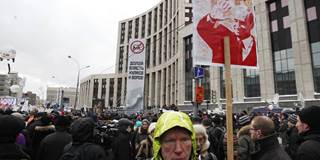Nothing riles up Western observers of Russia today as much as its law on foreign agents, which requires non-commercial organizations engaged in undefined “political activities” to register as “carrying functions of a foreign agent.” So what accounts for Russians' suspicion of organizations with external ties?
LONDON – Nothing so riles Western opinion about Russia today as its law on foreign agents. Enacted in July 2012, the law requires all non-commercial organizations (NCOs) engaged in (undefined) “political activities” to register with the Ministry of Justice as “carrying functions of a foreign agent.” A follow-up measure in 2015, the Undesirable Organizations law, required any such NCO to identify itself publicly as a “foreign agent.”
The wording is peculiar and significant. What, after all, are the “functions of a foreign agent,” in common parlance, except to serve the interests of a foreign power? Indeed, Russia’s law effectively prevents NCOs not under state control from carrying out any activities in the country. Certainly, the designation puts them beyond the reach of the Russian funding which might get them removed from the registry. They are not only foreign: they are infiltrators and traitors!
Some groups have gone into voluntary liquidation; others have been suppressed for not complying with regulations; and still others are in exile. Prominent victims have been the Sakharov Center, the Memorial Center for Human Rights, and the Moscow School of Civic Education. Having fended off an earlier attempt to stigmatize it as a “foreign agent,” the European University at St. Petersburg now faces closure for trivial technical violations – a favorite bureaucratic tactic.

LONDON – Nothing so riles Western opinion about Russia today as its law on foreign agents. Enacted in July 2012, the law requires all non-commercial organizations (NCOs) engaged in (undefined) “political activities” to register with the Ministry of Justice as “carrying functions of a foreign agent.” A follow-up measure in 2015, the Undesirable Organizations law, required any such NCO to identify itself publicly as a “foreign agent.”
The wording is peculiar and significant. What, after all, are the “functions of a foreign agent,” in common parlance, except to serve the interests of a foreign power? Indeed, Russia’s law effectively prevents NCOs not under state control from carrying out any activities in the country. Certainly, the designation puts them beyond the reach of the Russian funding which might get them removed from the registry. They are not only foreign: they are infiltrators and traitors!
Some groups have gone into voluntary liquidation; others have been suppressed for not complying with regulations; and still others are in exile. Prominent victims have been the Sakharov Center, the Memorial Center for Human Rights, and the Moscow School of Civic Education. Having fended off an earlier attempt to stigmatize it as a “foreign agent,” the European University at St. Petersburg now faces closure for trivial technical violations – a favorite bureaucratic tactic.